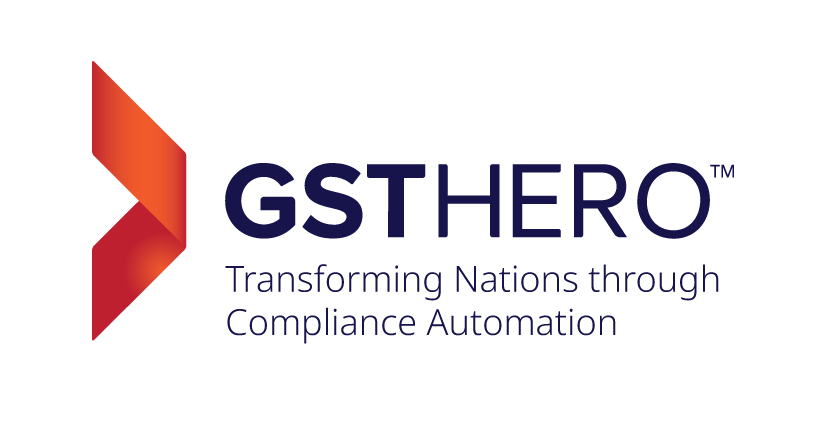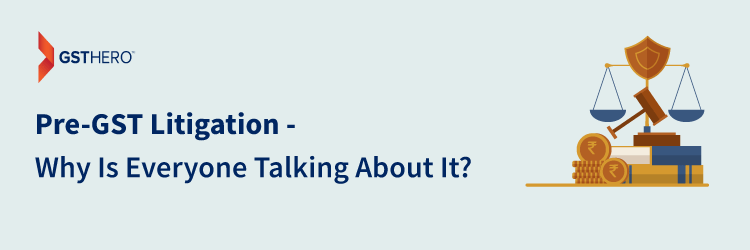The Indian tax system has undergone significant changes over the past decade. Tax rates, laws, and litigation have all been made simpler to increase compliance, ease of payment, and enforcement. Pre-GST litigation is important for business to increase their tax revenue.
However, the effects of direct/indirect tax litigation and tax administration rationalisation are a never-ending process. Before the implementation of the GST regime, the country's business landscape was dominated by several indirect tax heads.
Due to the volume of daily transactions they were in charge of due to various tax heads, businesses found it challenging to manage their taxation. Tax evasion and legal action were the outcomes.
Pre-GST litigation includes all litigation and cases arising from the pre-GST regime before July 2017. This litigation system covers excise, sales tax, VAT, and other taxes.
The intention behind implementing the scheme above is to end the age-old litigations of the pre-GST era through a settlement between the taxpayer and the government. Also, it enables government departments to contribute effectively to effective GST implementation and its challenges.
The amnesty scheme essentially provides for resolving pre-GST tax disputes by waiving a certain percentage of the tax demand, interest, and penalties associated with these disputes.
Read more related article:
Taxes before the implementation of the GST
There were two types of taxes in the pre-GST era, just as there are today: direct and indirect taxes. There is also tax litigation for all types of taxes.
Direct Tax: A direct tax is paid directly to the government by an individual or a business. In other words, the taxpayer cannot transfer any direct taxes to another party. Direct taxation consisted of the following:
Indirect Tax: An indirect tax is a type of tax levied on goods and services. Indirect tax is owed to the manufacturer, service provider, vendor, and so on. Consumers will eventually bear the burden. Indirect taxation was further subdivided into the following taxes:
- Sales tax
- Excise tax
- Service tax
- Customs Duty
- Value-added tax (VAT)
Pre-GST Litigation : Popular Factors
Disputes, disagreements, frauds, and illegal dealings were common in the pre-GST and GST regimes. In many companies, transactions cause conflicts and disagreements, and people are involved. It was challenging to keep track of all the tax heads because there were so many.
Some litigation cases result from tax audits conducted by officials, while others result from appeals filed by business owners or taxpayers.
Tax disputes initiated by the tax authorities on unstable legal grounds engage the taxpayer in a protracted legal battle until the High Court or Supreme Court can grant relief.
Read more articles:
GST Return Filing Online | Comprehensive Coverage On Types, Eligibility & Due Dates
Truth About Pre-GST Litigation Challenges Revealed
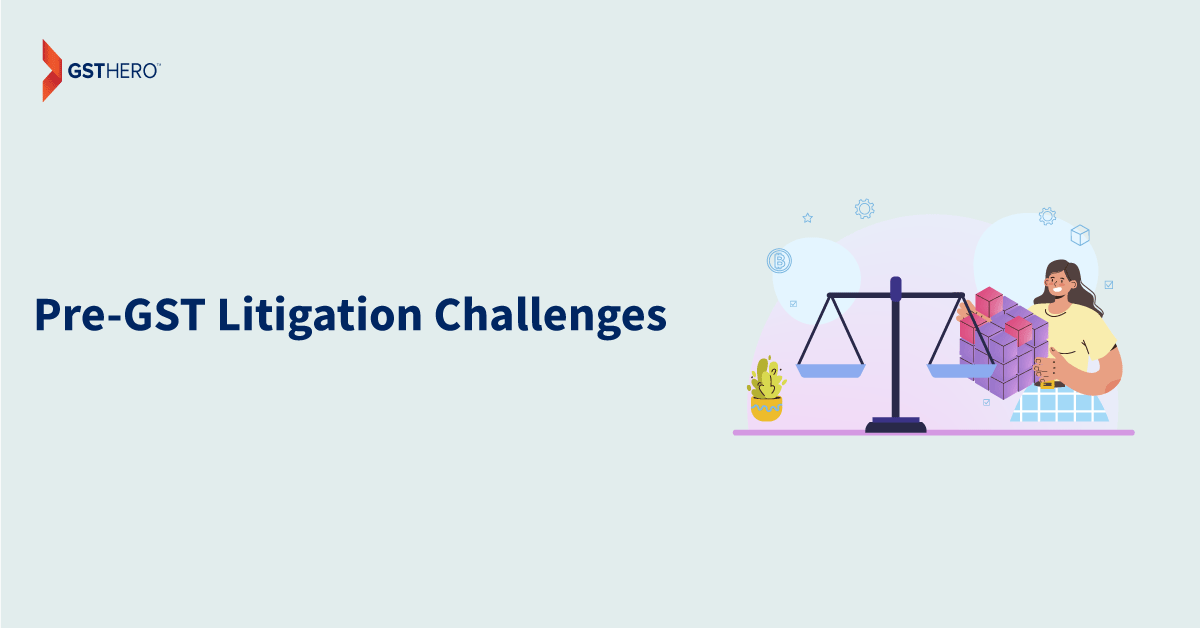
Get Free Bonus Report: Improve your litigation strategy
Handling pre-GST litigation is time-consuming for a variety of reasons. Here are a few reasons why:
- Manual work/documentation: Even today, much legal data is created and stored manually. Handling essential documents that were paper-based with no digital copies before the GST era is time-consuming.
- Misplaced documents: Certain documentation and paperwork from the pre-GST era are no longer available, making it difficult for taxpayers and authorities.
- Old Data/circulars: It isn't easy to find and use old government notifications and circulars in the current taxation system. Furthermore, tax laws have evolved significantly over time.
- Authority shifts: Several authorities, tax collectors, and court judges have retired, been transferred, or changed over time. In addition, because current GST litigation cases are on the rise, dealing with pre-GST litigation with new officials who may or may not be familiar with previous laws can also slow down the process.
- Current GST and tax rules are entirely different: The Indian judicial system has changed dramatically since implementing GST laws and the one-nation, one-tax regulation for businesses. As a result, other taxation systems have different rules and methodologies that must be followed.
- Delayed processing due to pending cases: The number of pending taxation cases in India is in lakhs. It is expected to rise further as the courts and officials handling the cases are overburdened.
- Frauds related to sales tax & VAT: A VAT raises the costs of doing business. It has the potential to encourage tax evasion. Costs that are passed on the result in higher prices, which disproportionately affect low-income consumers.
Read more related articles:
GST Audit – Who Is Supposed To Do It? | GST Audit Process
Input Tax Credit under GST with example | How to claim max ITC in 2023
GST Litigation – What is the Process?
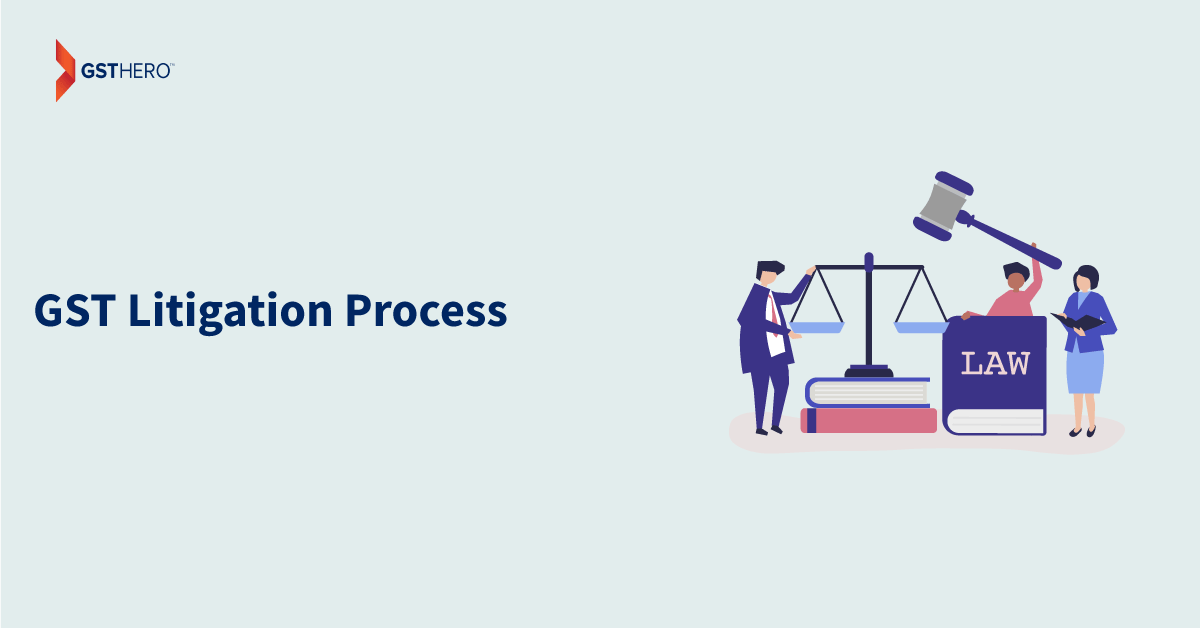
Get Free Bonus Report: Improve your litigation strategy
To streamline multiple ongoing cases/litigations, the assessee can follow the process outlined below.
- Examining the Notice/SCN/Order: The company must analyse and verify the notice or show cause notice (SCN) received from the GST department.
- Briefing the company and discussing the following steps: The next step is to prepare the company briefly, decide how to deal with the notice, and develop a plan of action to ensure the company's defense at all costs.
- Collecting required data/information/reconciliations: To prove your company's case, you will need a large amount of evidence, documents, data, and related information that you must collect and present to the officials.
- Verifying and Validating the data mentioned above/information: It is necessary to verify and validate the data after it has been collected to maintain accuracy.
- After conducting extensive research for a legal basis, draft a proper reply/appeal: Once you have all of the necessary information and documentation, you must document a suitable response to the notice.
- Submitting the Reply/Appeal: Once your response or appeal is complete, you must submit it to the department. No Appearance Before Settlement
- Authority/Commissioner (A)/Tribunal: The final step in the process is to appear before the Adjudicating Authority to defend your case.
Are you worried about GST Notices…?
How are you handling & tracking your notices?
GSTHero LMS is the answer- if you're looking for a time-saving, simple-to-use, and efficient Litigation Management Software.
GSTHero LMS (Litigation Management Solution) is here to help you with your GST litigation issues, such as keeping track of due dates and notices.
Handle GST notices with ease by providing the following:
- The dashboard provides the history of notices
- ERP Payment Block System - Bringing the Ecosystem Together
- Reports (GSTR 1 Vs GSTR 3B) (GSTR 1 Vs GSTR 3B)
- Notifications via Email
- Option to provide manual responses or feedback that will be directly uploaded to the portal
- Download all notices
- PAN-based notices
GSTHero LMS solution is created to assist you in effectively dealing with audit under GST and managing GST litigation.
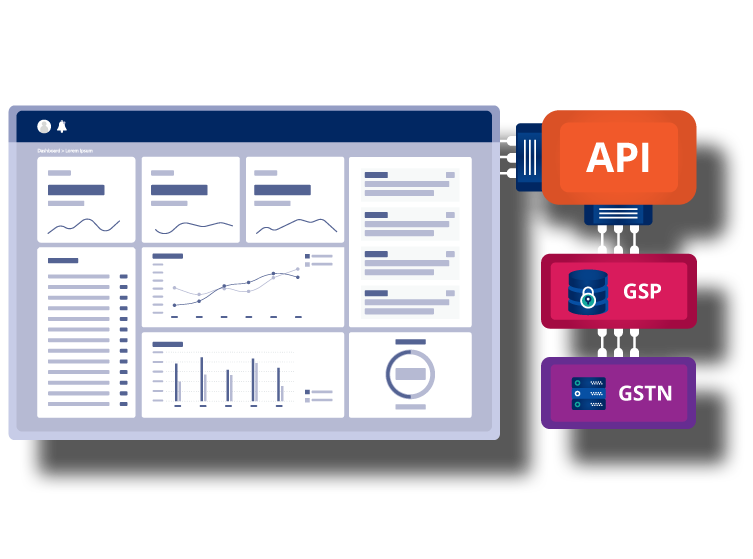
File your GST returns in minutes, not hours!
Get Live Demo and experience the simplicity by yourself.
